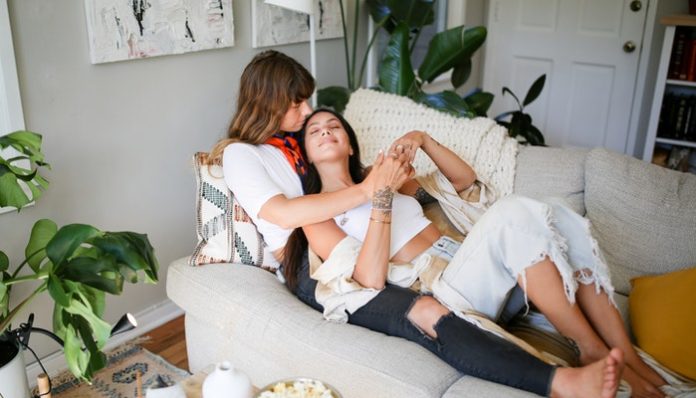
Rachel Maddow and Ellen DeGeneres are famous television figures. They are both lesbians. And they are in long-term relationships. In fact, DeGeneres is married to her partner (2008). Their relationships appear to the world as being close to perfect – let’s face it, in these times, even heterosexual relationships and marriages that last this long are to be celebrated.
Relationships start with dating – you know the drill. Boy meets girl, boy likes girl, girl likes boy, boy and girl begin to date. It happens around the clock, around the world. And all societies see this as the normal progression for relationships, no matter at what age.
But what about lesbian dating? Are there unique difficulties here? The answer is yes. It’s one thing to be Rachel Maddow or Ellen DeGeneres – they were well-known and popular figures before they came out as gay. And, they were pretty much insulated from the struggles that “every day” lesbians have in dating and in forming relationships. Here’s looking at some of those struggles.
Coming Out to Family and Friends (and the Public at Large)
While larger society is becoming far more accepting of LGBTQ+ dating and relationships, we are not “there” yet. And if you have followed politics lately, you know that many states are passing laws that marginalize what they have come to call “gays.” And it’s not just lawmakers. It can get pretty personal.
When girls come out as lesbians, they can face rejection from parents (if they are young and still living at home) or their friends who are not so accepting. This places a lot of pressure on them as they begin to date and form relationships.
When lesbians go out and show public displays of affection, they can face the stares and glares of the public. Straight couples don’t face this. It makes them feel marginalized and less than equal as if they have to hide their love and affection to the outside world. This adds another layer to the progress of dating and relationships that straights don’t face.
Meeting Up with Other Lesbians to Date
Straight couples may have met most anywhere – in school, at work, at happy hours, and other social events. Lesbians are in a minority and have limited access to other lesbians in these settings. And so they go to bars and clubs that are lesbian-friendly. This can be a less safe activity and can limit their “options” to find someone that might turn into a serious dating relationship.
Fortunately, the Internet has provided a partial solution to this. There are now places to go online to hook up with each other. I know – you can say that this has its dangers too. Yes, but if they are careful and use only reputable places, such as this app, they can make internet dating much safer. These reputable dating apps screen their members very carefully and make sure that everyone who joins has a profile that is honest. And there are other pluses. The good ones have deep profiles of members and geo-location when two decide to meet up in person. And there are all sorts of opportunities to chat and live stream before that ever happens.
Lesbians Tend to Fall Faster and Harder
In the lesbian community, there is a term, “U-Hauling it,” meaning moving in, often after a second date. According to Dr. Ruth Schwartz, Ph.D. who has worked with lesbian couples on many levels, this is quite common, especially if sex has already happened. She states lesbians tend to make commitments quickly because they do feel more limited in their options and they get into that “honeymoon phase” almost immediately if there is physical attraction. When reality sets in, they may find that they have made a mistake. This happens to straight couples too, but not nearly as often.
And when mistakes are made, the breakup can be painful and messy. After all, that U-Haul has to pull up again. In fact, Dr. Schwartz herself admits that in her younger years, this happened to her three times. It’s just that when you feel your candidate “pool” is limited and you really want sex and intimacy, you tend to cling to each other much faster.
Lesbians Have More Mental Health Issues That Spill Over into Dating Relationships
All people that fall within the LGBTQ+ community can develop mental health issues, as a result of rejection, prejudice, isolation, and bullying. Drug abuse and suicide rates, for example, are higher for them than in society as a whole.
But lesbians face additional issues that can lead to mental ill-health.
There’s Pressure to Label Themselves
This pressure often comes from other LGBTQ members who have come up with these labels.
Femme = A lesbian who is quite feminine in dress and actions
Butch = One who is masculine in dress and actions
Alpha = An attractive, very confident lesbian who may dress as either gender
There are not necessarily a “femme” and a “butch” in all lesbian relationships, even though when you look at Rachel Maddow or Ellen DeGeneres, you might think so. Lots of lesbian couples dress and act much the same.
They Have to Deal with Stereotyping and Assumptions
Straight and LGBTQ people project these onto lesbians:
- They hate men because they have “daddy issues”
- They were molested as kids
- They are lesbian because they aren’t attractive to men
- They are in a phase of experimentation and it will pass maybe because they have come out of a bad straight relationship
They Don’t Have a Dating Culture
Think about it. Gay men have a culture for dating. They can go to gay bars which cater to men. Lesbians may go to these too, but they are not as welcome. Even transgenders have their own clubs and events.
Gay men have more options for dating apps, specifically designed for them. Lesbians have to use the more all-encompassing apps.
The feelings of being isolated do lead to anxiety, depression, and stress. What’s more, it’s one of the reasons why they fall into relationships after only a few dates. And then they tend to stay in bad or abusive relationships because they believe their options are limited.
Lesbians still live and work and have their beings in a society that does not give them a fully free and open dating scene. They do have unique struggles, and their path to a happy, healthy relationship is filled with hurdles. Still, with some strength and a bit of support, they can have good dating experiences.
Photo by RODNAE Productions from Pexels



















In the midst of conflict, gay and lesbian couples are more optimistic. When bringing up a disagreement, gay and spider solitaire 2 suit couples use more affection and humor than straight couples do, and their partners react more favorably as a result. Couples that identify as gay or lesbian are also more likely to remain upbeat after a disagreement.